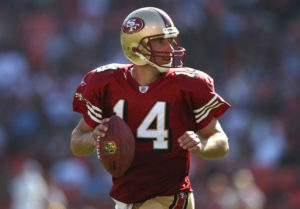
Coronado resident J.T. O’Sullivan grew up in Sacramento playing all sports. His favorite was throwing a football. He starred at Jesuit High School, but was not heavily recruited for college ball. He chose to play at UC Davis because they offered the best chance to be quarterback. After red shirting his freshman year, J.T. found himself number 4 on the QB depth chart. It was then he made the decision to work as hard as he could to show his coaches he could be the starter. His dedication and work ethic paid off as he started every game for the next three years throwing 96 touchdown passes over that span. After his junior season, when he threw for 3679 yards and 38 touchdowns, he became the only player in Division 2 to get a Heisman Trophy vote.

In 2002, O’Sullivan was drafted by the New Orleans Saints in the sixth round. In his 10 year career as a quarterback, he spent time with 11 NFL teams, including the San Diego (not Los Angeles) Chargers. He also played for the NFL Europe’s Frankfort Galaxy and the Saskatchewan Rough Riders of the Canadian Football League.
His most significant playing time was in 2008 when he started eight games for the San Francisco 49ers, his favorite team from childhood.
I sat down with J.T. on his porch to find out what brought him to Coronado and what his life was like after the NFL. It was obvious to me that O’Sullivan possesses a passion for learning. He has a Masters degree in Management, which he completed during the football off seasons; and is working on his PhD in Leadership Studies at the University of San Diego. The drive it took to play football at the highest level, O’Sullivan is bringing to his academic life. He currently works in San Diego State’s athletic department and his ultimate goal is to become a university athletic director. And how did he come to Coronado? His wife, Laura, grew up here. So when their oldest son was getting to elementary school age, they made the move from Ocean Beach to Coronado. J.T. has three young sons and loves the small town atmosphere of Coronado. Being a life-long learner, he especially appreciates the Coronado library, where he and his sons spend many hours hanging out.
I asked who he likes in the Super Bowl and despite being with the New England Patriots in 2006, he said he really is only hoping for a good game. Since leadership is a focus for O’Sullivan, he shared that Patriots’ coach Bill Belichick runs an organization like no other. Belichick is involved in every facet of the team. His attention to detail and holding everyone accountable is the key to the Patriots’ success year after year.
How about the Chargers moving to Los Angeles and maybe the Raiders coming to San Diego? J.T. is mostly just sad about the Chargers decision. He is sad for the city and sad for his friends who are, or were, life-long Charger fans. The Charger-Raider story he shared with me is not so much about the rivalry, but how in 2010, O’Sullivan was on the Charger roster when the Raiders beat the Chargers 35-27 in game 5. Later in the same season he was picked up by the Raiders in time for another Raider win 28-13.
On the issue of concussions and CTE, J.T. was fortunate to never be concussed playing football. His position as quarterback shielded him from the everyday hits, since no one is allowed to touch the quarterback in practice. O’Sullivan believes the real issue is the repetitive hits players take during practice, and over many years that is as dangerous to causing CTE as the spectacular, devastating hits seen on TV. O’Sullivan didn’t play tackle football until high school and would recommend the same for kids today. Less brutal hits being policed by evolving rules and advances in equipment technology should allow the game of football to continue to thrive.
Moving from team to team, state to state, and even country to country taught J.T. O’Sullivan the benefits of diversity. His network of friends and colleagues literally spans the globe. Moving so much is hard on the family and was the primary reason O’Sullivan did not pursue coaching as a career. His goal remains to be a leader in education, using all he has learned in football, academia and life in general. Occasionally, J.T. teaches leadership classes to undergrads at USD. One of his favorite motivational speeches is that of South Africa’s Nelson Mandela during the 1995 World Cup — “Sport has the power to change the world. It has the power to inspire. It has the power to unite people in a way that little else does. It speaks to youth in a language they understand. Sport can create hope where once there was only despair. It is more powerful than government in breaking down racial barriers.”




